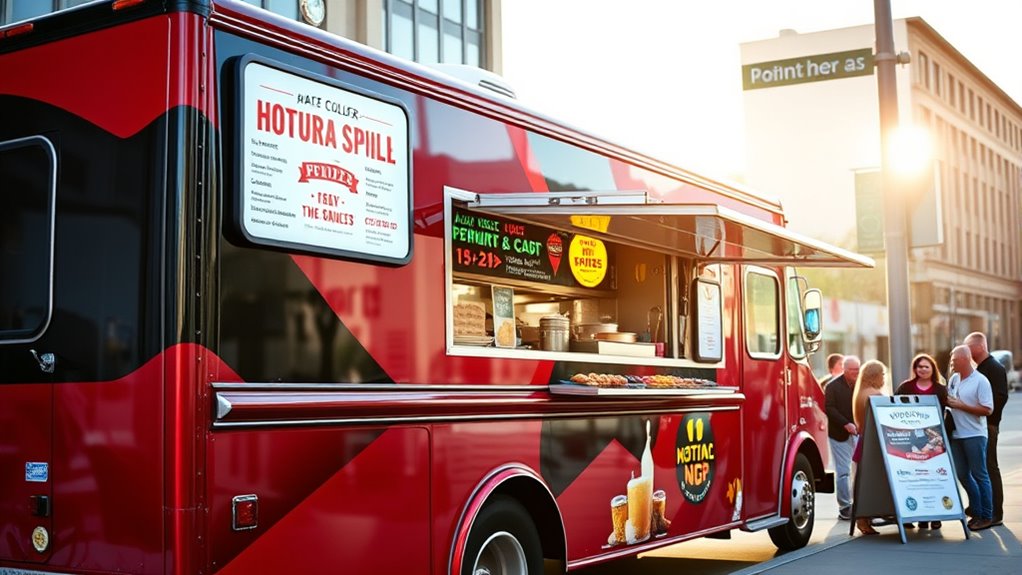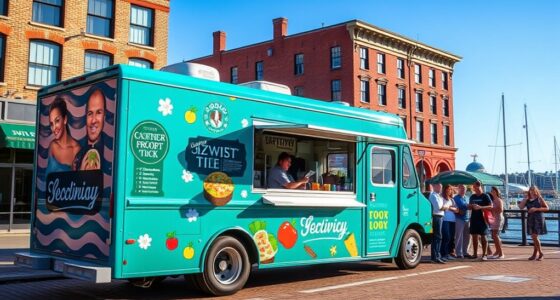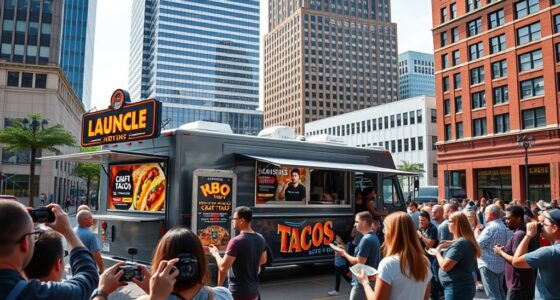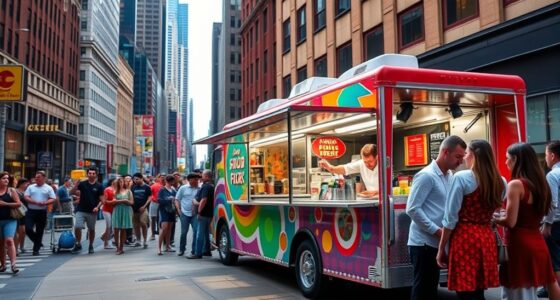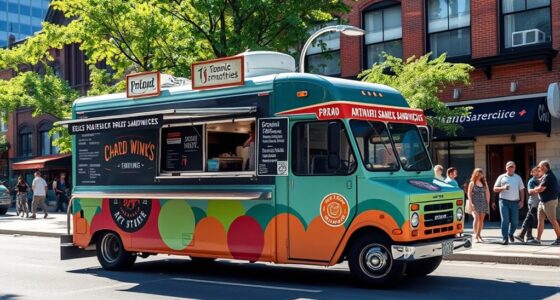To open a food truck in Rochester, MN, you’ll need permits from Olmsted County and the City Clerk’s office, along with a Food Handler License from the Minnesota Department of Agriculture. Budget around $40,000–$150,000 for your truck and plan on monthly expenses of $500–$1,000. Choose high-traffic locations near Mayo Clinic or downtown, craft compliant menus, and use social media to attract customers. Staying on top of these details can help your business succeed.
Key Takeaways
- Obtain necessary permits from Olmsted County Public Health and Rochester City Clerk, including a Food Handler License and display all licenses visibly.
- Budget for startup costs around $42,000–$153,000, including truck purchase, inventory, licensing fees, and ongoing expenses.
- Choose strategic locations like downtown, near Mayo Clinic, or event spaces to maximize customer exposure and foot traffic.
- Develop a compliant menu with quick-prep items using approved equipment, ensuring food safety standards are met.
- Promote your food truck via social media, participate in local events, and implement loyalty programs to increase customer engagement.
Navigating Permits and Licensing Requirements in Rochester
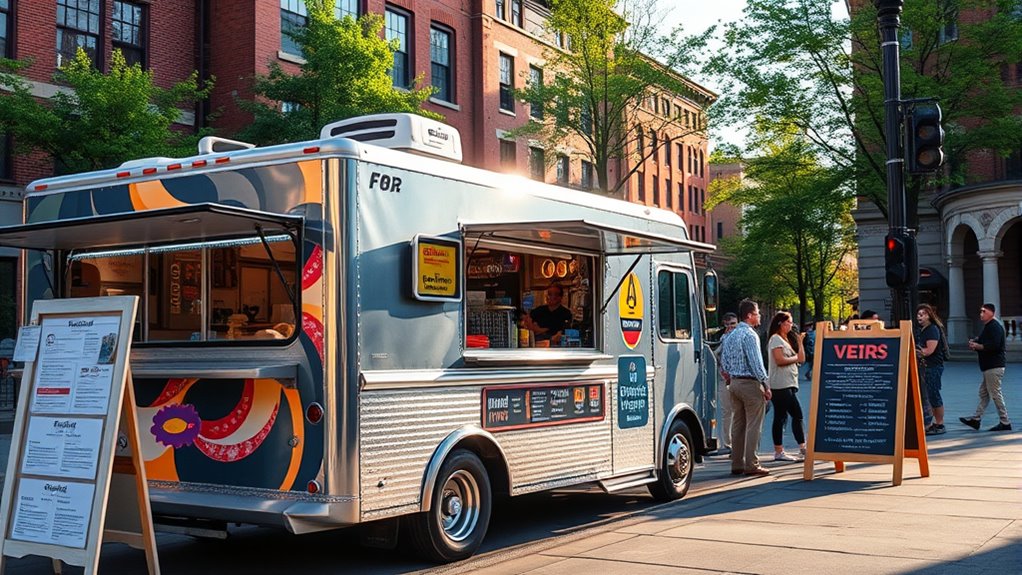
Are you interested in starting a food truck business in Rochester? To do so, you’ll need to navigate several permits and licensing requirements. First, contact Olmsted County Public Health Services at 507-328-7500 for your mobile food unit permit and schedule pre-operational inspections. The City Clerk’s office at 507-328-2900 handles city-specific licenses, including franchise and city licenses. You must also obtain a Food Handler License from the Minnesota Department of Agriculture, which requires a $50 fee and proof of a commercial supply source. Submit detailed construction plans for review at least 30 days before building your unit. Once approved, pass a final inspection before starting operations. All licenses must be visibly displayed on your vehicle during vending. Additionally, all mobile food units must comply with the Minnesota Food Code and obtain a Food Handler License for personnel involved in food handling. Understanding the food safety regulations is crucial to ensure compliance and protect your customers.
Understanding Costs and Fees for Your Food Truck Venture
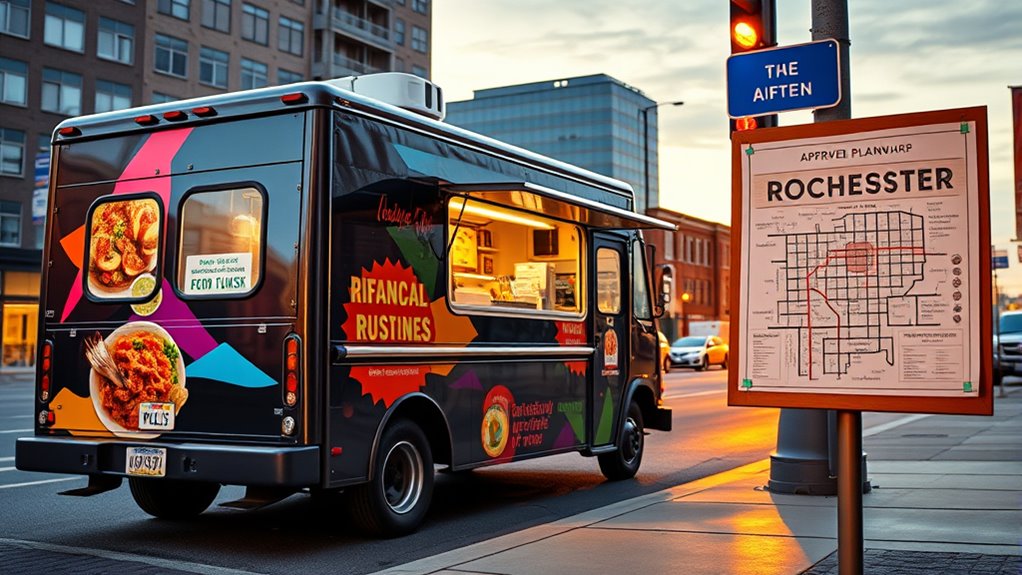
Understanding the costs and fees involved in starting a food truck business in Rochester is essential for creating a realistic budget and ensuring your venture is financially sustainable. Startup costs vary widely, with trucks costing between $40,000 and $150,000, plus $2,000–$3,000 for initial inventory and around $300 for supplies. Fuel and maintenance can run $500–$1,000 monthly. Licensing involves a $50 initial application fee, plus costs for a Rochester franchise and MDA license, which are influenced by business size and food safety risks. Insurance is a significant ongoing expense. Here’s a quick overview:
| Cost Category | Estimated Range |
|---|---|
| Truck Purchase/Build | $40,000–$150,000 |
| Monthly Operating | $1,000–$2,000 (fuel, maintenance) |
| Licensing Fees | $50 + franchise/license costs |
| Inventory & Supplies | $2,000–$3,000 |
Additionally, understanding permits and fees is crucial to avoiding unexpected costs and ensuring compliance with local regulations.
Choosing Strategic Locations to Maximize Exposure
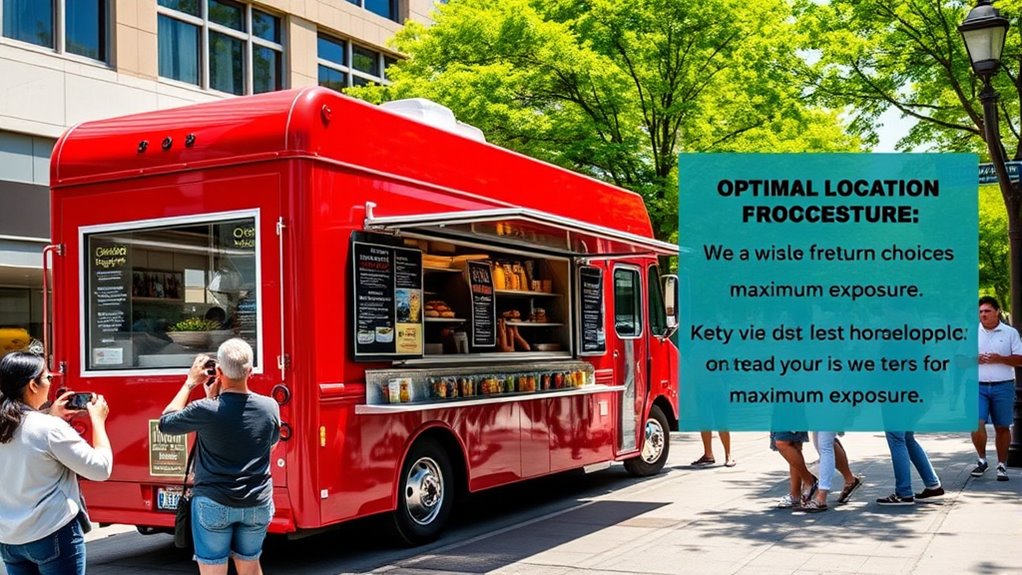
Selecting the right locations for your food truck can considerably boost visibility and sales. High-traffic spots like 3rd Avenue SE near Highway 14 and Broadway Ave S already attract food trucks like Azteca Mexican Tacos, making them ideal for exposure. Proximity to Mayo Clinic guarantees steady lunch and evening crowds of visitors and staff. Downtown areas such as 12th St SE and 5th Place NW offer foot traffic from shoppers and workers. Events and festivals in parks or community spaces bring temporary surges of customers. Near universities, like the University of Minnesota Rochester, you’ll find younger demographics with regular dining needs. Use tools like StreetFoodFinder and social media to track busy hours, share your schedule, and explore underutilized spots to avoid saturation, maximizing your truck’s reach. Understanding local zoning laws and regulations can also help you identify suitable sites and avoid potential legal issues. Additionally, researching permitting requirements for food trucks ensures compliance and smooth operations as you establish your presence.
Planning Menus and Ensuring Food Safety Compliance
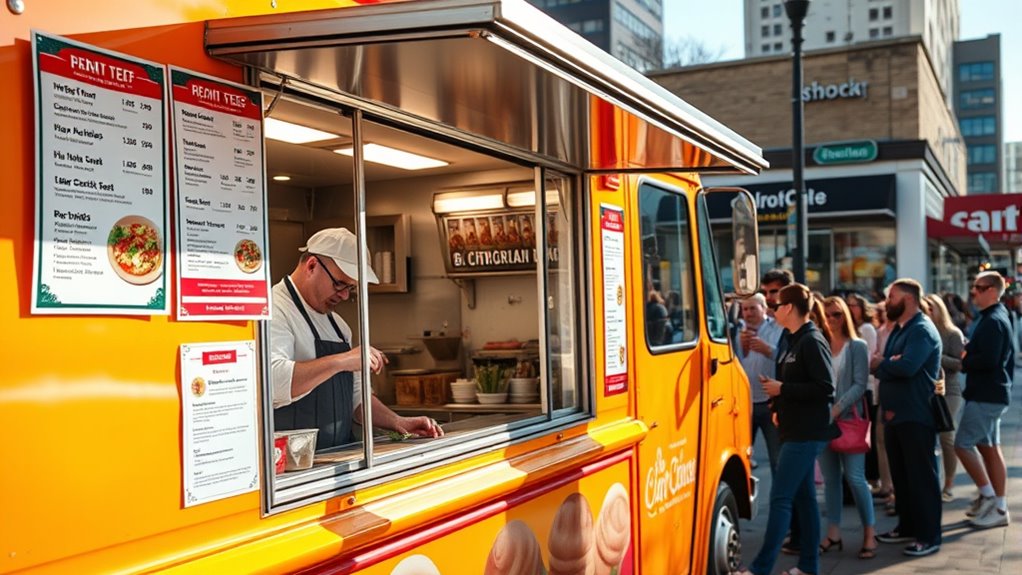
Planning your menu carefully is essential for a successful Rochester food truck, especially since it must comply with the Minnesota Food Code to ensure food safety. You need to contemplate equipment limitations, which influence acceptable preparation methods, and include your menu in construction plans for regulatory approval. To stay compliant and efficient, focus on these key areas:
- Ensure menu items meet food safety standards and fit equipment capabilities.
- Specify anticipated storage, preparation, and sales volumes in your plans.
- Design your menu for quick prep to match your mobile service model.
- Use approved, easily cleanable equipment that maintains proper temperature controls.
- Remember that all new food businesses, including mobile food trucks, will operate under updated licensing rules, which may impact menu planning and operational procedures. Updating your operational procedures ensures your menu and operations comply with the new regulations.
Following these steps helps you meet licensing, inspection, and food safety requirements, creating a safe and successful operation.
Marketing Strategies and Customer Engagement Tactics
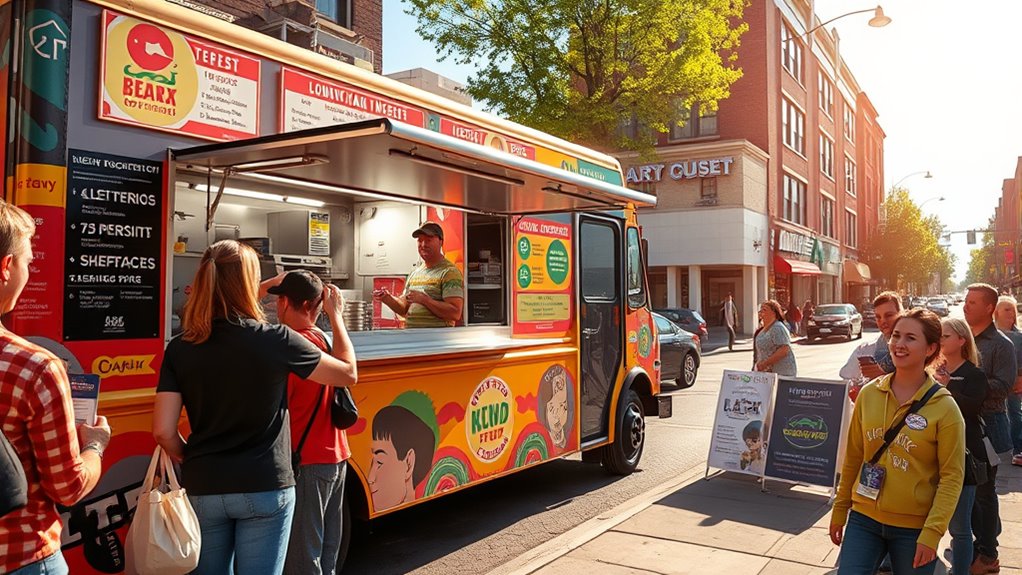
Effective marketing and customer engagement are key to building a loyal following for your Rochester food truck. Social media is a powerful tool—75% of food trucks use Facebook actively, while platforms like Instagram, TikTok, and Snapchat help you reach younger audiences. Customers discover about 40% of trucks through social media ads, and active engagement can boost their spending by 15%. Participating in local festivals and community events increases visibility, foot traffic, and community ties. Loyalty programs, which over half of trucks implement, can increase repeat visits by 30%. Using digital tools like GPS tracking apps and data analytics helps you reach customers more effectively and improve marketing ROI. Sharing high-quality content and collaborating with local influencers strengthen your brand and attract new customers. Incorporating seasonal and holiday-themed promotions can lead to a 25% rise in customer visits, further boosting your overall marketing effectiveness. Additionally, understanding privacy and cookie usage policies can help you develop compliant online marketing strategies that respect customer data preferences.
Frequently Asked Questions
How Long Does the Licensing Approval Process Typically Take in Rochester?
You’re probably wondering how long the licensing approval process takes in Rochester. Usually, it lasts about 2 to 4 weeks from the time you submit your application, but delays can happen. Completing all your paperwork accurately and early helps expedite things. Keep in mind, inspections and coordinating with multiple departments might extend the timeline. Applying well in advance ensures you get your license before you start operating.
Are There Specific Permits Required for Operating During Festivals or Special Events?
When operating during festivals or special events, you’ll need a Special Event Permit from the City Clerk’s Office, which costs $100 plus any extra fees. You might also require additional permits like right-of-way obstruction, temporary liquor licenses, tent permits, or fire permits, depending on your setup. Make sure to submit your applications early with detailed plans to guarantee you meet all requirements and avoid delays.
Can I Operate My Food Truck Year-Round in Rochester?
Yes, you can operate your food truck year-round in Rochester. There’s no legal limit on operating days, but you must comply with licensing, health, and safety regulations, including winter preparations like heating and water supply. Vending hours are restricted, and you can’t vend near parks. Keep in mind the costs and seasonal challenges, but with proper planning, year-round operation is definitely achievable.
What Are the Parking Restrictions for Food Trucks in Rochester?
Parking in Rochester for your food truck is like steering through a maze—there are rules to follow. You can’t park larger trucks in many areas, and parking meters run from 8 a.m. to 5 p.m. on weekdays. After hours and weekends, parking is free. You must adhere to distance rules near parks, avoid restricted zones, and obtain permits for park vending. Always check posted signs to stay on the right side of the law.
Are There Any Subsidies or Financial Assistance Programs for New Food Truck Operators?
You’re wondering about subsidies or financial assistance for new food truck operators. Rochester offers several options, like microloans up to $35,000 through the Southern Minnesota Initiative Foundation, which supports food businesses. Additionally, programs like the SBA partnership can help secure federal loans. Local organizations, including Catholic Charities and LSS, provide financial counseling and emergency aid, which can help you manage startup costs and stabilize your new food truck venture.
Conclusion
Starting your food truck journey in Rochester means turning vibrant city streets into your personal canvas. Picture your truck bustling with hungry customers, the aroma of your signature dishes filling the air as your brand becomes a familiar sight. With the right permits, strategic spots, mouthwatering menus, and smart marketing, you’ll transform everyday corners into lively hubs of flavor and community. Embrace the adventure, and watch your food truck thrive amidst Rochester’s lively, welcoming spirit.
